|
Blog Feeds
Anti-Empire
The SakerIndymedia Ireland is a volunteer-run non-commercial open publishing website for local and international news, opinion & analysis, press releases and events. Its main objective is to enable the public to participate in reporting and analysis of the news and other important events and aspects of our daily lives and thereby give a voice to people.
Public InquiryInterested in maladministration. Estd. 2005
Voltaire NetworkVoltaire, international edition
|
The Irish in Foreign Armies : REMEMBRANCE national |
anti-war / imperialism |
feature national |
anti-war / imperialism |
feature
 Tuesday October 07, 2008 16:47 Tuesday October 07, 2008 16:47 by Pat Muldowney by Pat Muldowney lest.weforget at live dot ie lest.weforget at live dot ie
 Lest We Forget: WAR CRIMES
The Remembrance season is approaching. We will be called upon yet again to show maturity, to support reconciliation, to advance peace --- by participating in ceremonies which celebrate aggression, violence and war crimes!.
Mayo "Peace" Memorial
Related Links:Coolacrease - The Hidden Interview
Mayo "Peace" Memorial
 by Nick Folley - none by Nick Folley - none Sat Oct 18, 2008 02:45 Sat Oct 18, 2008 02:45   Relative to the posts here on the famine, I have in front of me a copy of the Pictorial Times dated Saturday, October 17, 1846. The front page reads:  by Munster Fusilier by Munster Fusilier Mon Oct 20, 2008 09:17 Mon Oct 20, 2008 09:17   Examiner Letters Page:  by Jim Crane by Jim Crane Tue Oct 21, 2008 23:22 Tue Oct 21, 2008 23:22   Coolacrease: The True Story of the Pearson Executions  by Pat Muldowney by Pat Muldowney Thu Oct 23, 2008 13:47 Thu Oct 23, 2008 13:47 lest.weforget at live dot ie lest.weforget at live dot ie   Remember Irish soldiers "doing their duty":  by joe McIvor by joe McIvor Thu Oct 23, 2008 19:22 Thu Oct 23, 2008 19:22   Shamefully no commemoration was held in Ireland last year to mark the 150th anniversary of what Mr Cafferty would probably term the Indian Mutiny . Indians refer to the uprising of 1857 as the First Indian War of Liberation :it was ruthlessly suppressed by a British army in which many Irishmen served . What were they serving?  by Pat Muldowney by Pat Muldowney Sat Oct 25, 2008 09:03 Sat Oct 25, 2008 09:03 lest.weforget at live dot ie lest.weforget at live dot ie   The British Legion frolicking with the Fuehrer
 by Pax persona by Pax persona Sat Oct 25, 2008 11:05 Sat Oct 25, 2008 11:05   Those photos of the British Legion are intriguing and incriminating. Were there many Jewish ex-servicemen in the British Legion in that year 1938? How would they have felt about the first photo of a senior Legion member being received by Hitler and Hess, bearing in mind the shocking memories of anti-Jewish laws promulgated by the nazis from 1933 onwards, including the prohibition of intermarriage and the ruthless deprivation of citizenship and livelihood rights, and culminating in the Kristallnacht pogroms and atrocities in November 1938 ? [ Admittedly Kristallnacht happened a few months after that sunny photo was taken.]  by Pax persona by Pax persona Sat Oct 25, 2008 15:02 Sat Oct 25, 2008 15:02   Right, I realize that I've confused the date of the BL-Hitler photo taken in 1935 in Berlin with the later one taken of BL volunteers intending to police the Sudetenland parading in London in 1938. Even by the summer of 1935 the nazi laws imposing ghastly disabilities and humiliations on German Jews had taken effect; so it would be interesting to know how many British Jews were ex-servicemen in the BL at that time. And as for the BL volunteer parade photo of 1938, it would again be of interest to know what feelings British Jewish ex-servicemen went through when they heard about British volunteers intending to help nazi Germany's occupation of the Sudetenland in that year.  by Pat Muldowney by Pat Muldowney Sun Oct 26, 2008 13:34 Sun Oct 26, 2008 13:34 lest.weforget at live dot ie lest.weforget at live dot ie   A point was raised in one of the posts above about the unfavourable treatment of Weimar democracy by Britain, and its facilitation of Hitler fascism. The argument in brief is that the terms of the Versailles Treaty were unreasonably and unfairly enforced against democratic Germany, producing a shift in German support towards the National Socialist movement which was serious about challenging the Versailles system. And when the Hitler movement achieved power, his power was consolidated and entrenched when the Versailles provisions were suspended in his favour.  by Pat Muldowney by Pat Muldowney Sun Oct 26, 2008 15:55 Sun Oct 26, 2008 15:55 lest.weforget at live dot ie lest.weforget at live dot ie   ... the colossal gift of the Czech armaments industry to Hitler.  by Pat Muldowney by Pat Muldowney Sun Oct 26, 2008 16:08 Sun Oct 26, 2008 16:08   The reference in the last post but one is to "Britain's traditional Balance of Power policy" which sought, by strategic alliances, to foment war against whichever European power was strongest at any particular time. That was usually France, and Britain's usual ally was Prussia.  by Munster Fusilier by Munster Fusilier Mon Oct 27, 2008 22:34 Mon Oct 27, 2008 22:34   Examiner Letters  by Munster Fusilier by Munster Fusilier Thu Oct 30, 2008 10:13 Thu Oct 30, 2008 10:13   "County" Supplement in "Irish Examiner", 28.10.2008:  by kevin murphy - 32 csm by kevin murphy - 32 csm Thu Oct 30, 2008 19:24 Thu Oct 30, 2008 19:24   Its no surprise to note that Mr Buckley has used the heavily politicised buzzword " peace " in an attempt to confer false respectability upon his mainly British imperialist theme park in Mayo , itself a district were dreadful genocide was committed by the country whose armed forces Mr Buckley is intent on promoting as respectable.  by Nick Folley - none by Nick Folley - none Fri Oct 31, 2008 18:45 Fri Oct 31, 2008 18:45   From a recent copy of the Cork Independent, an article by Finbarr Cullen  by Philip O'Connor - Irish Political Review by Philip O'Connor - Irish Political Review Sat Nov 01, 2008 07:58 Sat Nov 01, 2008 07:58   "Irish" Regiments: The Empire they fought for  by Philip O'Connor - Irish Political Review by Philip O'Connor - Irish Political Review Sat Nov 01, 2008 08:08 Sat Nov 01, 2008 08:08   2. "Irish" Regiments: The Empire they fought for  by Pat Muldowney by Pat Muldowney Sun Nov 02, 2008 09:21 Sun Nov 02, 2008 09:21 lest.weforget at live dot ie lest.weforget at live dot ie   What did Hitler mean by “real Indian war”?  by joemcivor by joemcivor Sun Nov 02, 2008 15:27 Sun Nov 02, 2008 15:27   P O' C made a slip . He wrote  by Munster Fusilier by Munster Fusilier Tue Nov 04, 2008 12:38 Tue Nov 04, 2008 12:38   Examiner Letters Nov 4 2008:  by jp - none by jp - none Tue Nov 04, 2008 23:13 Tue Nov 04, 2008 23:13   As usual the Irish get it wronge, lets all help Hitler and see how fast the Irish survive, ups sorrey the Irish were afraid so decided to let other nations defend them except, the many thousands of Irish men and women who were not cowards and were prepared to fight for freedom under many diffrent flags. I don't recall the Irish Nationalish condemming the Irish Americans fighting in Vetiam or any othre parts of the word. Yes we should remember all national soliders who give there best for there country, but not the people who are afraid to wear a uniform 24 hours a day, not just at night.  by Nick Folley - none by Nick Folley - none Wed Nov 05, 2008 00:29 Wed Nov 05, 2008 00:29   It seems to me that Irish men fighting in say, the British Army or US army for that matter are fighting for Britain or the US, and not for 'their country' (i.e Ireland). Could we also argue for instance, that Germans who fought in the US army during WW2 or in Vietnam were fighting for Germany (i.e 'their country'). If so, then the lexis of the English language has no meaning whatsoever. I think it's time to drop the pretence that Irishmen who fought in Vietnam or Korea or Monte Cassino did it 'for Ireland'. They may have done it for England, or the Allied cause, or because they were anti-fascist or anti-communist, or they needed the money.  by Munster Fusilier by Munster Fusilier Wed Nov 05, 2008 08:56 Wed Nov 05, 2008 08:56   Examiner, Wednesday, November 05, 2008  by Leinster Rifler by Leinster Rifler Thu Nov 06, 2008 10:24 Thu Nov 06, 2008 10:24   Kevin Myers  by Munster Fusilier by Munster Fusilier Thu Nov 06, 2008 10:29 Thu Nov 06, 2008 10:29   Examiner Letter, Thursday November 06 2008:  by Francis Ledwidge - Neither King nor Kaiser but Ireland by Francis Ledwidge - Neither King nor Kaiser but Ireland Sat Nov 08, 2008 16:55 Sat Nov 08, 2008 16:55   The Cork Lord Mayor, Clly Brian Bermingham, thinks the gassing and slaughter of the European working class between 1914-18 should be celebrated. What better way to do it than to organise a fancy dress ball and 'and night of nostalgia'. 1918: Shot At Dawn CLICK IMAGES TO SEE OR READ THEM BETTER
 by Napoleon Blownapart by Napoleon Blownapart Sat Nov 08, 2008 19:54 Sat Nov 08, 2008 19:54   Dress up like one of them exploding British projectiles that left horrific injuries (see earlier thread on Dum-Dum bullets)  by munster fusilier by munster fusilier Sun Nov 09, 2008 11:18 Sun Nov 09, 2008 11:18   “LEST WE FORGET”  by Nick - none by Nick - none Sun Nov 09, 2008 22:42 Sun Nov 09, 2008 22:42   These placards placed outside Cork City Hall served to remind patrons that the event they were celebrating and its connection to Poppy Day has another side. The Britiah nation is still a nation engaged in colonial wars - as in Iraq and Afghanistan, by way of example. Moreover, this City Hall was built to replace the previous one burnt down - along with a big part of Cork city centre, by British forces (both official military and Black and Tans) in 1920. To the right can be seen the bust of one of Cork's first two republican Mayors - Thomas McCurtain (murdered by British forces in his home in 1920) and Terence McSwiney (died in Brixton prison on hunger strike - and force fed by British authorities - for the republican cause). Sad to think that some people today wish to throw away with both hands what these men gave their lives for. But it just goes to prove that democracy is not guaranteed to be self-perpetuating.  by Shane - wsm (pers cap) by Shane - wsm (pers cap) Mon Nov 10, 2008 11:44 Mon Nov 10, 2008 11:44   Wear a white poppy, as conceived in Britain by the Women's Co-operative Guild and taken up by the Peace Pledge Union:  by Nick - none by Nick - none Tue Nov 11, 2008 14:52 Tue Nov 11, 2008 14:52   Today's Irish Examiner carried this article on World War One and its consequences.  by Nick - none by Nick - none Tue Nov 11, 2008 14:56 Tue Nov 11, 2008 14:56   This report on the City Hall event is from the Evening Echo of Monday 10 November 2008. I notice there is no mention of the protest that took place outside the City Hall from an hour before the concert began. Though small in size, I would have thought that a local-interest newspaper like the Echo would at least have commented on it.  by Yellow Haired Lady by Yellow Haired Lady Tue Nov 11, 2008 23:53 Tue Nov 11, 2008 23:53   A few weeks back, I was taking a leisurely stroll from Westminster Station to Trafalgar Square (thats right, I am living amongst the auld enemy). It is only a stroll of a few hundred yards but to pass this journey, I found myself doing something very strange. I began to count the number of statues which celebrated war and to my surprise there were over 20 (Sesame Street didn't go any higher) statues celebrating war in just a few hundred yards. Insane.  by Munster Fusilier by Munster Fusilier Thu Nov 13, 2008 10:36 Thu Nov 13, 2008 10:36   Examiner Letter, Thursday, November 13, 2008  by MUNSTER FUSILIER by MUNSTER FUSILIER Mon Nov 17, 2008 08:26 Mon Nov 17, 2008 08:26   Monday, November 17, 2008  by Connacht Ranger by Connacht Ranger Mon Nov 17, 2008 08:49 Mon Nov 17, 2008 08:49   Examiner Letters  by Connacht Ranger by Connacht Ranger Mon Nov 17, 2008 09:31 Mon Nov 17, 2008 09:31   Apology for double posting above - unforeseen consequence of the "30-Minute Publish Delay".  by Pat Muldowney by Pat Muldowney Tue Nov 18, 2008 20:04 Tue Nov 18, 2008 20:04   Hitler’s Table Talk, 1941-42 (Translation by Hugh Trevor-Roper):
 by Pat Muldowney by Pat Muldowney Sat Nov 22, 2008 11:40 Sat Nov 22, 2008 11:40   More from Hitler's Table Talk, 1941-2:  by Nick - none by Nick - none Tue Nov 25, 2008 01:50 Tue Nov 25, 2008 01:50   1. Wrong way  by Captain Bone-All Duckley - The Mustachio Club by Captain Bone-All Duckley - The Mustachio Club Tue Nov 25, 2008 10:01 Tue Nov 25, 2008 10:01   Remembrance is Commemoration.  by Captain Donkey Buck-All - The Mustachio Club by Captain Donkey Buck-All - The Mustachio Club Tue Nov 25, 2008 20:06 Tue Nov 25, 2008 20:06   Further to #1 above.  by Captain Doolaly Bonkers - the Mustachio Club by Captain Doolaly Bonkers - the Mustachio Club Fri Nov 28, 2008 22:41 Fri Nov 28, 2008 22:41   The killing of human beings is usually a serious crime. But it can be legal, even commendable, in some circumstances. A state can decide if and when its citizens may kill other human beings with impunity – as penal executioners, as police officers, as private citizens defending themselves against mortal threat, as soldiers in a war situation.  by Robert Nairak by Robert Nairak Mon Dec 01, 2008 22:50 Mon Dec 01, 2008 22:50   Your argument is OK as far as it goes, Captain. I agree that the official commemoration, by states, of state killing (so-called sacrifice), is highly problematic, and has the potential to undermine civilised standards in human conduct.  by Robert Nairak by Robert Nairak Tue Dec 02, 2008 09:52 Tue Dec 02, 2008 09:52   Incidentally, I endorse wholeheartedly the letter of David Roberts in last week's Examiner, quoted in this thread a couple of posts back.  by Captain Noddly Allbuck - the Mustachio Club by Captain Noddly Allbuck - the Mustachio Club Wed Dec 03, 2008 07:41 Wed Dec 03, 2008 07:41   Ye have heard men say: Blessed be the peacemakers.  by revised revisionist by revised revisionist Wed Dec 03, 2008 08:39 Wed Dec 03, 2008 08:39   History is written by winners. Most WW1 and WW2 films we see have been made by American and British movie companies, though in recent years some subtitled war movies have appeared here from Germany. We rarely see Soviet or Russian subtitled war movies on Irish cinema or TV screens - and most deaths of civilians and combatants in WW2 were suffered by what Churchill and FDR often referred to as "our gallant allies" the USSR. Result: we understand WW2 from an Anglo-Amerikanski perspective.  by Nick - none by Nick - none Thu Dec 04, 2008 01:06 Thu Dec 04, 2008 01:06   One of the best 'war movies' I have seen is a Russian (Soviet) one dating from 1985 entitled "Come & See" in English. It suffers from rather poor dubbing and subtitles into English, and is a bit drawn out, but is excellent on other fronts. First of all it documents in grimy detail the suffering endured by Russians during that period - 650 villages burned down in Byleorussia alone.  by Captain Bundle Donkey - the Mustachio Club by Captain Bundle Donkey - the Mustachio Club Fri Dec 05, 2008 09:47 Fri Dec 05, 2008 09:47   McAleese: "A good war justifies any cause!"  by African by African Sat Dec 06, 2008 08:10 Sat Dec 06, 2008 08:10   Story at:  by James Giblet - Our News by James Giblet - Our News Sat Dec 06, 2008 12:19 Sat Dec 06, 2008 12:19   See also:  by Sir Cahir O'Doherty by Sir Cahir O'Doherty Sun Dec 07, 2008 09:47 Sun Dec 07, 2008 09:47   Report from the Inish Times, Wednesday December 3 2008:  by Bloggo by Bloggo Sun Dec 07, 2008 18:39 Sun Dec 07, 2008 18:39   Have crypto-unionists taken over our media?  by Captain Buachaill san Éirne - the Mustachio Club by Captain Buachaill san Éirne - the Mustachio Club Sat Dec 13, 2008 18:07 Sat Dec 13, 2008 18:07   Ireland was obedient to British militarism in 1914. Five generations of essential subordination had brought that about.  by Captain Lee-buck Alldone - the Mustachio Club by Captain Lee-buck Alldone - the Mustachio Club Sun Dec 14, 2008 10:21 Sun Dec 14, 2008 10:21   McAleese: “ALL WAR IS GOOD!”  by Captain Alley Bonduck - the Mustachio Club by Captain Alley Bonduck - the Mustachio Club Wed Dec 17, 2008 14:02 Wed Dec 17, 2008 14:02   A Warlike Peace Park  by Tom Moran - Retired by Tom Moran - Retired Tue Dec 23, 2008 19:52 Tue Dec 23, 2008 19:52   A very sad and misconceived web-site. Remembrance has two purposes: to honour the courage and bravery of those who died and thereby to help realise the futility of war. Remembrance does not glorify war!  by Goeballs - No Balls by Goeballs - No Balls Wed Dec 24, 2008 17:13 Wed Dec 24, 2008 17:13   Tom,  by Emily Lawless by Emily Lawless Wed Jan 07, 2009 20:10 Wed Jan 07, 2009 20:10   War-battered dogs are we,  by Rudyard Kipling by Rudyard Kipling Fri Jan 09, 2009 17:13 Fri Jan 09, 2009 17:13   "Similarly imbued with the seventeenth-century covenanting spirit was that remorseless foe of the rebels, John Nicholson, who on news of the rebellion formed a Movable Column from British and Punjabi irregulars. Moving with great speed, he wreaked havoc wherever he led them in the Punjab: one tactic which he soon adopted was the blowing away of mutineers from cannon mouths. Lieutenant Frederick Roberts (later Lord Roberts of Kandahar and Waterford, and Commander in Chief in India)—the famous 'Bobs'—commented that Nicholson's methods were "awe-inspiring certainly, but probably the most humane as being a sure and instantaneous mode of execution". However that may be, "blowing rascals away from guns", as the Ulster-born Colonel James Graham put it, was also designed to have a major deterrent effect in that it challenged the Hindu belief in reincarnation."  by Winston Churchill by Winston Churchill Sat Jan 17, 2009 09:27 Sat Jan 17, 2009 09:27   Reader's letter, Saoirse, January 2009: British Torture in Kenya  by Colonel Bogey - ex British Army Officer by Colonel Bogey - ex British Army Officer Sun Jan 18, 2009 03:47 Sun Jan 18, 2009 03:47   I understand the bitterness of many correspondents here, but our British Armed Forces often did, and do, a highly professional job today - particularly in air-sea rescue around the seas off Ireland. Our Army today is still the most professional in the world - compare our civiliised performance in Iraq, for instance, where the Royal Irish Regiment, performed their duties with humanity and compassion compared to the Americans. A soldier has to do his duty according to orders wherever he or she is, and that is what many of the men simply did, that many of you critize here.  by Heinrich Himmler by Heinrich Himmler Sun Jan 18, 2009 09:44 Sun Jan 18, 2009 09:44   "A soldier has to do his duty according to orders wherever he or she is":  by John Duddy by John Duddy Sun Jan 18, 2009 10:41 Sun Jan 18, 2009 10:41   Of course I will be criticised for Bloody Sunday - but it is now a fact that martin McGuinness opened fire first on highly-nervous Paras...  by TERESA O CONNOR - retired from politics S.F by TERESA O CONNOR - retired from politics S.F  Mon Mar 09, 2009 11:18 Mon Mar 09, 2009 11:18 tadoc18 at hotmail dot com tadoc18 at hotmail dot com clara co offaly clara co offaly nil nil while many irishmen and possibly women fought for and of behalf of the british army have any of you taught of what those men were told at the time of enlistment . that been if they went out to fight to foreign country,s for our enemy the brits that on their return home their country would be free but of course this did not happen it was just another of the brits dirty tricks those dirty tricks have been going on for hundreds of years and its the Irish who suuffered as a result . but lets not forget those Irish men needed to support their families and that was a means to them of doing so . i am sure they did not enlist for the love of britain maby their was some misguided ones who did . but who are we to condemn them when we have not got a clue of what that Ireland of yesterday was like . but one thing the brits did do for their returning soldiers was they built houses under the sailors and soldiers act and they housed those ex service men ,, but while we Irish can never forget britains atrocities we have to accept the past for one reason only And that reason is ,We cant change it .. and with our own country now hopefully settled down to peace north and south we should respect what all our Irish men fought for and they all played a little part in Irelands freedom which i hope we will have one day, Jamea Daly should neve be forget for his brave stand in the mutiny in India . in 1921. and does it really matter who commerates him as long as hes not forgotton . wheather it be Sinn Fein or any of the main parties god rest all Irelands bravest men and women of all centuries iIreland would be a much better place to live in if their was no class distinction and we were all treated as equals .. one thing important we should all remember is everyone is entitled to their own point of view . And if we respect that then thats half the battle Tiocfaidh Ar La  by Pat Muldowney by Pat Muldowney Tue Apr 07, 2009 11:26 Tue Apr 07, 2009 11:26   Read it and weep:  by Ramirez - Dada by Ramirez - Dada Tue Apr 21, 2009 14:33 Tue Apr 21, 2009 14:33   This is simply preparing the ground for the day when young Irish men and women will be conscripted into some Euro version of the North Atlantic Terror Organisation. First glorify these foul disgusting deeds as the Brits and Yanks have been doing with their damned military for centuries then con the ethnic minorities, sub working class proles into believing murder in a uniform is dignified "work".  by Nick Folley - none by Nick Folley - none Sat May 16, 2009 14:05 Sat May 16, 2009 14:05   This piece from last January's Phoenix makes for interesting reading. It highlights the different treatment given to RTE's coverage of World War One last November and it's coverage of the 90th anniversary of the First Dail (January 1919). We hear so much about how 'constitutional and democratic politics' are favourable to rebellion and insurrection. There has been much criticism from some quarters on the way this country found it necessary to go to war (starting in 1916, but of course emphasized beyond doubt in the period 1919 - 1921) in order to secure its independence, even in watered-down form. One would have thought then, that the expressly democratic and constitutional approach of Sinn Feins election victories in 1918 and 1920 and the setting up of the First Dail in 1919 would be a cause for celebration and remembrance (especially as the Redmondite tradition in this country appears to frown on the revolutionary aspect of that period of our history). Apparently not so, if RTE's coverage is anything to go by. The madness and slaughter of World War One (and for what?) is to be 'celebrated' ad nauseum while our own democratic populist attempts at independence hardly merit a footnote. Does RTE have some kind of agenda? Or does war simply make better TV than democracy? Even if it does, while it is one thing to show war movies as entertainment (at least we understand them as fiction) Poppy Day and all that goes with it is another matter. History then becomes harnessed to current political ends and fiction dressed up as fact and the 'proper order of things'. Should the state broadcaster, funded in part by licence fees, be party to this charade?  by Bertrand by Bertrand Fri May 22, 2009 10:59 Fri May 22, 2009 10:59   "The Irish who died in WW1 helped to save Ireland too..don't forget." Ah yes, the freedom of small nations. Nyasaland had to wait for its emergency in the late 1950s before independence was granted to a compliant Dr. Hastings Banda, who became known during the following 30 dictatorial years as one-man Banda. |




![[Dublin] National Demonstration: Freedom for Palestine - End Gaza Genocide - Sanctions Now! nat_demo_palestine_feb17.jpg](../cache/imagecache/local/attachments/feb2024/72_54_1_1_5_0_0_0_0_0_nat_demo_palestine_feb17.jpg)



















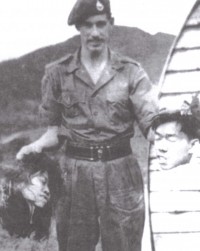
 We are currently not accepting any more comments on this article.
We are currently not accepting any more comments on this article. printable version
printable version

 Digg this
Digg this del.icio.us
del.icio.us Furl
Furl Reddit
Reddit Technorati
Technorati Facebook
Facebook Gab
Gab Twitter
Twitter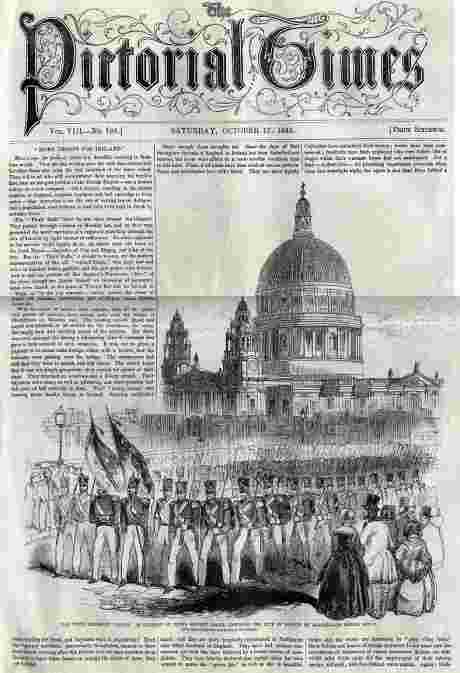
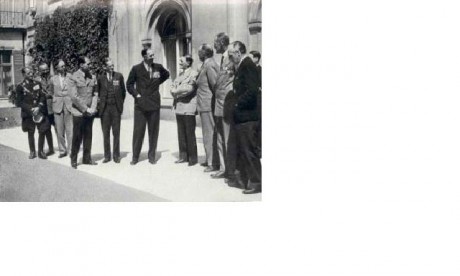
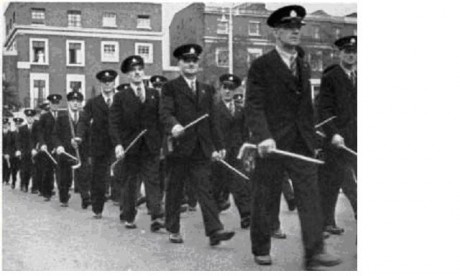
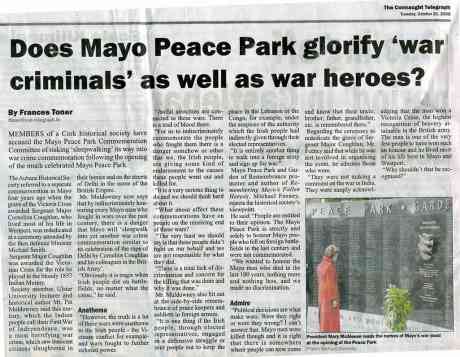
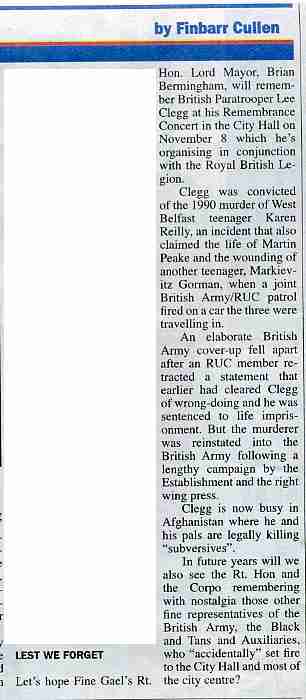
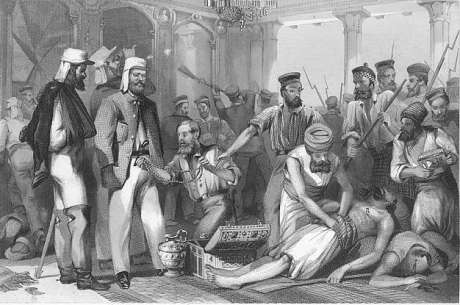
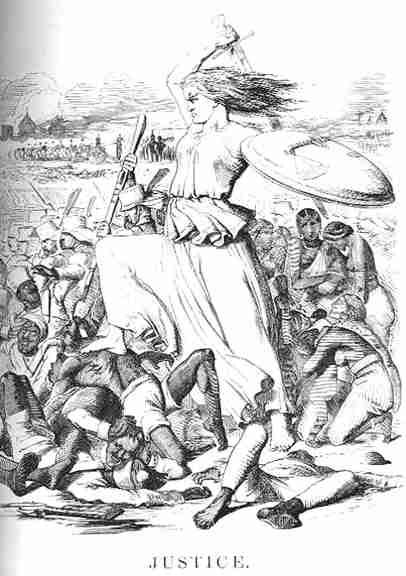
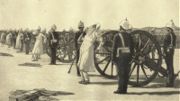
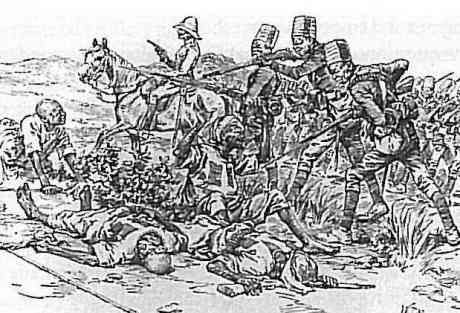
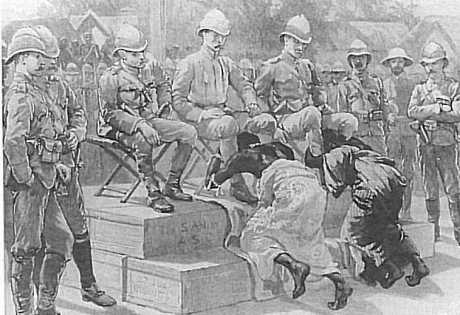

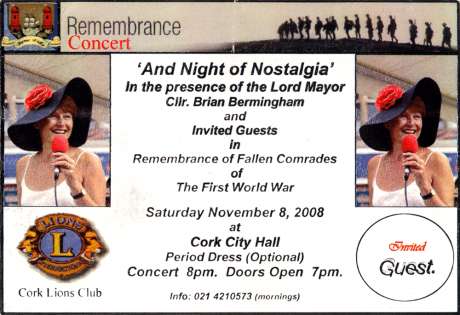
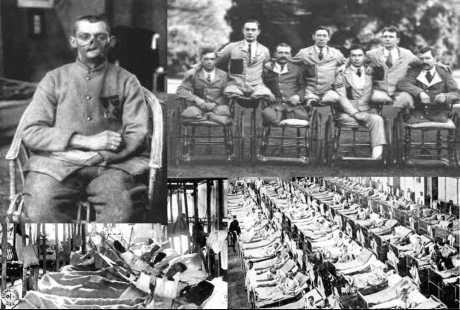
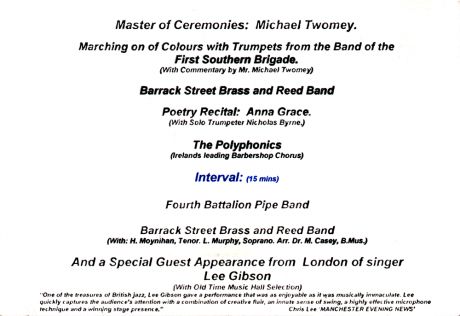
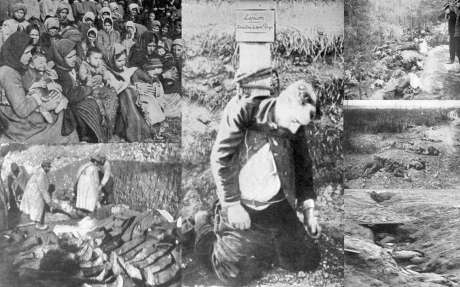
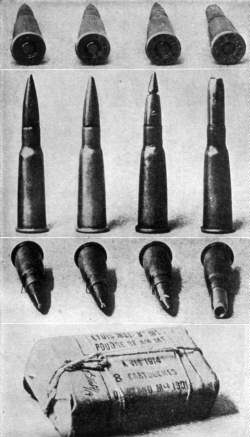
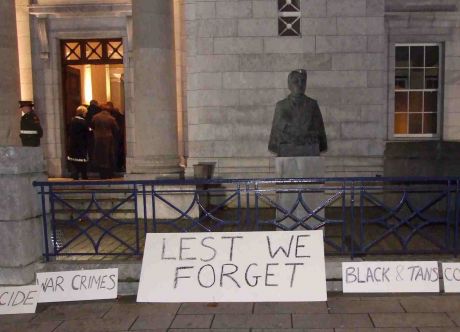
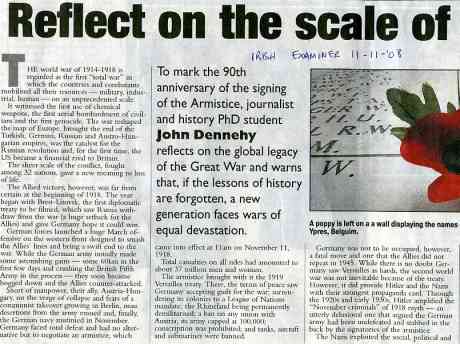
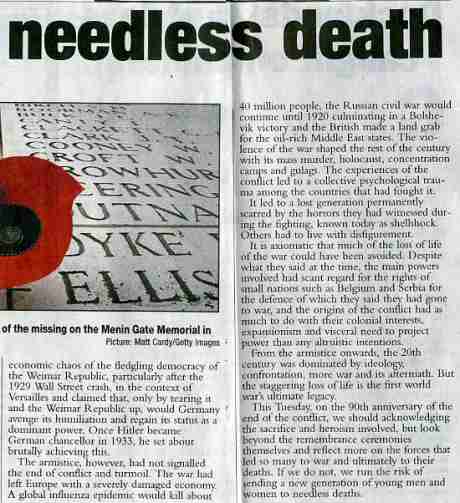
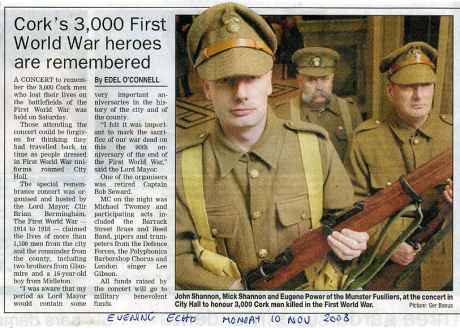
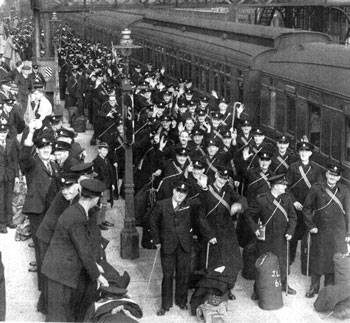
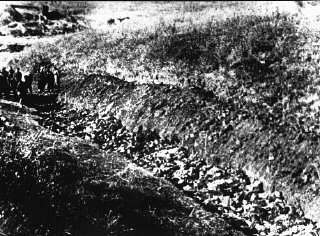

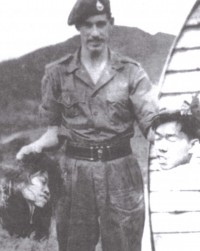
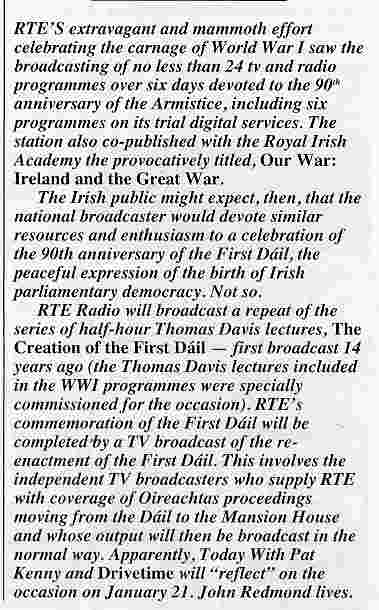

View Comments Titles Only
save preference
Comments (106 of 106)
Jump To Comment: 1 2 3 4 5 6 7 8 9 10 11 12 13 14 15 16 17 18 19 20 21 22 23 24 25 26 27 28 29 30 31 32 33 34 35 36 37 38 39 40 41 42 43 44 45 46 47 48 49 50 51 52 53 54 55 56 57 58 59 60 61 62 63 64 65 66 67 68 69 70 71 72 73 74 75 76 77 78 79 80 81 82 83 84 85 86 87 88 89 90 91 92 93 94 95 96 97 98 99 100 101 102 103 104 105 106The photograph above is from the so-called Malayan "Emergency", 1948-1960.
Captain Donal Buclkey (retired from Irish Army after 22 years - having possibly achieved an appropriate rank of incompetence) is leading the campaign to commemorate Irishmen in imperial armies, most notoriously Cornelious Coughlan who killed Indians for rebelling against British rule in 1857, using savage methods. Redcoats with muskets fired off a volley at his grave in 2004, in the presence of the Irish Minister for defence and of the British Ambassador.
See Buckley's justification of the the imperial 'peace' park here:
p://www.irishtimes.com/newspaper/letters/2008/0922/1221998222138.html
A response appeared a few days later:
http://www.irishtimes.com/newspaper/letters/2008/0924/1....html, also below
Irish Times Wednesday, September 24, 2008
Irishmen in British uniforms
Madam, - It seems that Capt Donal Buckley (Irish Army, retd) has widened this debate to include Irishmen in any uniform (September 22nd). He writes to promote the incongruously named Mayo Memorial Peace Park, due to be opened next month, which will commemorate "Co Mayo's 20th-century fallen officers, enlisted ranks and civilian casualties".
Among those to be commemorated are those who fell in the first and second World Wars, in Korea, and Vietnam. There will apparently be individual monuments to those who fell with the Connaught Rangers, the Irish Guards, Commonwealth and US forces. Amazingly, Capt Buckley claims it is a symbol of Ireland's maturity that those who "died for us" will be commemorated. He makes the grandiose claim that they died for "Mayo, Ireland and the free world".
In what way did a soldier fighting for the US in Vietnam "die for Mayo, Ireland and the free world"? How did a soldier who fought in any of Britain's imperial wars "die for Mayo, Ireland and the free world"? At this remove one can only guess at the motives of these men. They enlisted, mainly in the British army, for many reasons - some for lack of employment at home, some for adventure and glory, and others because they were duped by British propaganda.
The Mayo Memorial Peace Park appears to be part of a trend which aims to associate Ireland more closely with former colonial powers, particularly Britain, and conveniently to gloss over their murky deeds. The argument seems to be that all Irishmen who died in wars are heroic and deserve to be publicly commemorated while moral arguments must be cast aside for the sake of "reconciliation". I suggest that the purpose of such memorials should be examined more critically, particularly when public money and land are given over to them.
I note that President McAleese will open the park, thereby giving it the imprimatur of the Irish people. On the evening prior to the opening, the drums and pipes of the Irish Guards will take part in a remembrance concert. It is ironic that a regiment of the British army will be represented at this concert, while no mention will be made of the atrocities perpetrated by that army in many parts of the world, including Ireland.
Capt Buckley was also instrumental in organising an event in 2004, which commemorated Sgt-Maj Cornelius Coughlan. This Mayo man was a member of the imperial British forces in India that put down a mutiny. He was awarded a Victoria Cross for his bravery. At the commemorative event the Irish Army was represented and the then Minister for Defence, Michael Smith, as well as the British ambassador attended. This bizarre ceremony ignored the reality that Coughlan's regiment used savage methods to quell rebellion.
It is patently obvious from Capt Buckley's letter that there will be no place in the Mayo Memorial Peace Park for those Mayo men and women who died for the freedom of Ireland. His references to "parochial politics" and "right-thinking people" are breathtaking in their arrogance. It may surprise him to learn that many people are saddened to witness the glorification of colonial militarism. - Yours, etc,
MARK URWIN
Click on the body of the Phoenix article to read it in your browser
Phoenix 3rd Oct 08 on on encouragement to join imperial armies and on Buckley's brigade
In Kenya's white minority legislative council on 7 May 1953, brutal treatment was urged to put down an uprising by the Kenya Land and Freedom Army, popularly known as the Mau Mau. By May 1953 over 100,000 Kikuyu tribes-people had been deported from their homes and transferred to tribal reserves "a place many of them hardly knew". In addition, transit camps were established without water, food or sanitation, in which thousands languished for months.
The demand was summed up by a Major Keyser:
The rebellion took place after 90% of the 1.5 million Kikuyu took an oath for land and freedom. While the military side of the rebellion was put down by 1954, it took another six years of brutality to put down the 1,000,000 Kikuyu who remained defiant. After that, Britain thought Kenya ready for independence.
Captain Buckley (retired) will be keen to include Mayo men who might have died for the British Empire in Kenya. If I find any in the excellent book Imperial Reckoning - the Untold Story of Britain’s Gulag in Kenya by Caroline Elkins, I will be sure to bring them to his attention.
There are a few already who sound almost Irish, though I don't know how keen most Irish people would be to claim them. For instance there is the Kenyan Minister for Defense, Jack Cusack, who said approvingly of forced labour gangs: "We are slave traders and the employment of our slaves are, in this instance, by the Public Works Department".
The tribal reserves became saturated by the deportations, leading a District Commissioner, Desmond O'Hagan, to plead for a halt, a "temporary" one. He estimated that 20-30,000 had been returned to each Kikuyu district: "It is certain that the native land cannot absorb all those who have returned."
Then there is the systematic torture in the prison camps, that held thousands. This involved castration as well as amputation, together with systematic beatings of one kind or another. It went on for years and is summarised well at:
http://www.smokebox.net/archives/what/morgan605.html
Here is a section partly on a definite Irishman Terence Gavaghan, still alive and in London apparently:
Gavaghan is the kind of Irish chap that Buckley might include in his memorial, if Gavaghan is from Mayo, and had he been deservedly shot as a war criminal.
Elkins makes the interesting point that Gavaghan's "ethnic background" might have made him "someone who, in an embarrassing situation, could be sacrificed". This made him the "perfect person" to spearhead the torture regime in Kenya. The British don't do torture, foreigners do it, on their behalf if necessary
Read:
Imperial Reckoning, by Caroline Elkines, Henry Holt and Company, 2005
"How a society warped by racism can descend into casual inhumanity"
"It will shock even those who think they have assumed the worst about Europe's era of control in Africa"
Why is President Mary McAleese, from Belfast, the President of Ireland, endorsing this imperial warwagon on Tuesday next, October 7?
Catch yourself on, Mary.
Amritsar Massacre
Remembrance ceremonies celebrate all British military actions from the Great War onwards, including the Black & Tan War, Bloody Sunday (both of them), the shelling of Dublin, the 1916 executions, the burning of Cork, collusion, covert operations including the Dublin and Monaghan bombings, Yemen, Cyprus, Iraq, Afghanistan. Nothing excluded.
The first Remembrance was on November 11 1919. The British military action at Jallianwalla Bagh (Amritsar Massacre) took place just six months earlier on April 13 1919.
The gist of what happened in Amritsar is conveyed in the film “Gandhi” (ten thousand unarmed men, women and children trapped in an enclosed area; Brigadier-General Reginald Dyer, played in the film by Edward Fox, ordered soldiers to open fire on them for 15 minutes, killing about 400 and wounding about 1200; Indian sources claim that the casualties were much higher).
According to the recent RTÉ programme “Who Do You Think You Are” (September 22), Joe Duffy’s great-grandfather served in the Connaught Rangers near Mumbai, and continued in the British Army until 1920.
Will the upcoming Remembrance ceremonies in Dublin, Cork and elsewhere be honouring Sir Michael O’Dwyer of Solohead, Co. Tipperary? O’Dwyer, though not a soldier, was martial law ruler of Amritsar, at the time of the massacre in 1919, and subsequently of all of the Punjab. General Dyer said that he was confronted by a revolutionary army in Amritsar, and that his purpose was to administer a moral lesson to the Punjab as a whole. O’Dwyer gave Dyer his full support, in the face of worldwide revulsion and outrage at the atrocity. It is believed in India that O’Dwyer planned the massacre in conjunction with Dyer.
O’Dwyer was descended from a family which was dispossessed and transplanted in the Cromwellian conquest. He was proud of his Irish heritage, and wrote the history of the O’Dwyers (“The History of an Irish Sept”, recently republished).
O’Dwyer was dramatically shot dead by Udham Singh on the stage of Caxton Hall, London, at a public meeting in 1940. O’Dwyer extended his hand to Singh to welcome him onto the stage. As he did so, Singh fired a revolver that he had obtained from an IRA man in a pub for this purpose; declaring: “This is for Amritsar!”.
After the 1857 Mutiny and the British slaughter, the destruction of Indian agriculture in favour of Imperial trade continued, including the massive narcotics trade in opium. Likewise the destruction of Indian manufactures in favour of British industrial monopoly. The resulting famines in India are described in Mike Davis’s book “Late Victorian Holocausts”.
The revolutionary movement Ghadar (Mutiny) was formed by Indian exiles in America, supported at various times by Irish Republicans, the German Kaiserreich, and the Soviet Union. A revolt of Indian soldiers in the British Army in Singapore took place in 1915. This can reasonably be compared with Ireland’s 1916 Rising.
But in view of the results of the 1857 Mutiny, Indian options were severely limited. Early in the 19th century, the Times summarised the British position on the Repeal of the Union with Ireland: “Ireland will be our sister or our subjugatrix”. In other words, there was no limit to the amount of force that would be deployed to suppress any dissent from British rule in Ireland. India likewise.
So mainstream India supported Britain in the Great War in the expectation of being rewarded with some relief from British rule --- or even a measure of "sisterhood". The opposite happened. Civil rights were suspended and the system became ever more draconian. Yet another war was waged against Afghanistan in 1919, all paid for by rapacious taxation of poverty-stricken Indians.
This is the context of the Amritsar Massacre. Will it be acknowledged in Ireland’s Remembrance ceremonies?
Amritsar Massacre
Udham Singh arrested in Caxton Hall after shooting Sir Michael O'Dwyer
The first Remembrance day was November 7 1919.
Captain Donal Buckley (retired) made a plaster saint out of Cornelius Coughlan from the Connaught Rangers, who won his VC preventing Indians from throwing off the British imperial yoke in 1857, in India's first war of independence. 10,000,000 Indians were killed by the British in putting down that rebellion.
There is a more recent, hitherto much more famous and much more deserving Connaught Ranger who was killed while in the the British King's command in 1921. He was 21-year-old James Daly, shot by firing squad in Dagshai prison India on November 2nd 1920, the last serving 'British' soldier to be shot for mutiny.
The mutiny began when news of the Irish War of Independence, and Black and Tans and Auxiliary reprisals reached the Connaught Rangers 1st Battalion at Jullundur. Five men from C Company refused to take orders from their officers on 28 June 1920, declaring their intent not to serve the British King until the British forces left Ireland. The Union Flag at Jullundur in the Punjab was replaced by the flag of the Irish Republic.
The mutiny ended after three days. The mutineers were imprisoned at Dagshai. At Solan in the Rangers detachment rumours spread that the Irish prisoners had been executed. Private James Daly led about 70 Rangers who joined the mutiny and stormed the armoury. They were unsuccessful. Privates Sears and Smyth were shot dead and other mutineers were taken prisoner. In all, about 400 men had joined. Eighty-eight were court martialled, fourteen sentenced to death and the rest sentenced to up to 15 years. A few were acquitted. Thirteen of those sentenced to die had their sentences commuted to life imprisonment.
21-year-old Daly was shot by a firing squad in Dagshai prison on 2nd November 1920. He has the rare Irish distinction to be the last member of British Forces executed for mutiny. Privates Sears and Smyth were buried at Solan. Daly and John Miranda (a mutineer who died in prison) were buried at the Dagshai graveyard.
The Dail passed the Connaught Rangers (Pensions) Act in 1936. It provided for the payment of pensions, allowances, and gratuities to or in respect of certain former members of the 1st Battalion, the Connaught Rangers. The effect was to give the Mutineers parity of esteem with veterans of the Anglo-Irish War.
In 1970, the remains of Sears, Smyth and Daly were taken back to Ireland and given a military funeral with full honours. A monument stands to the memory of the mutineers in Glasnevin Graveyard.
Whose example of service in the Connaught Rangers do you think the people of India would prefer us to celebrate, that of the imperial butcher Coughlan or that of Daly and his comrades, whose country’s fight for liberation awakened until then dormant anti-imperialist instincts? They might be quite surprised to see an Irish minister celebrating someone committed to keeping India, and Ireland for that matter, down.
Who served his country better, Coughlan or Daly? Who served India better?
Captain Buckley (thankfully retired) wants to resuscitate the old imperial system of support for aggressive imperial wars overseas. The reason, there are those in the Irish Army and government who want to break away from the tradition of neutrality in Ireland. They were defeated in the Lisbon Referendum, but they think this type of imperial propaganda will aid their cause. It won't. It will expose their intentions - the Mayo Peace Park is a sham.
Cornelius Coughlan Connaught Ranger look-alike musket and all and Fianna Fail Minister for Defence Michael Smith - celebrating imperial butchery
Gravestone in Glasnevin Cemetery Dublin, remembering the Connaught ranger mutineers. When was the last time you saw a Fianna Fail minister at that gravestone
Who do the Irish people want to celebrate, Cornelius Coughlan, the British soldier who put down Indian independence, or James Daly, the British soldier who mutinied against imperialist rule. Daly ended his days as an Irish soldier, recognised as such by an act of the Oireachtas in 1936, in 'The Connaught Rangers (Pensions) Act'.
That a retired 'Irish' solder today should betray the memory of Private Daly in favour of a British soldier who killed in the name of the British Empire is a scandal.
"If you want to know who the leader is, I am - James Daly, number 35025 of Tyrellspass, County Westmeath, Ireland"
Irish Times Tuesday, September 23, 2008
Irish Times Thursday, September 18, 2008
The reference above to Lt Bury refers to the Irish Times allowing a serving member of the British Army in Afghanistan to produce imperialist propaganda in a regular column - becuase Bury is from Wickow! National chauvinism at its best (or worst maybe) in the service of British chauvinism. The Phoenix article above mentions how Bury's propaganda is being used to induce more cannon fodder from these shores to join a foreign army. What other country's media allows a former colonial power to advertise for killers and for its particular brand of killing.
The letters above are stating it as it is from those who know - leave Buckley's and Bury's imperial propaganda behind and celebrate Ireland's anti-imperialist, not its pro-imperialist, heritage.
The headline from "4NI.co.uk - Northern Ireland on the Internet" says it all.
Commemorating war in the name of peace - what was that about 'doublespeak'?
Commemorating past wars is order to soften us up for future ones. Making war and imperialism respectable.
Where is ireland going?
If my memory serves me well I can recall that the British butcher General Dyer tried to, or did actually pass a law in which Indian citizens had to crawl on their hands and knees down a particular street in Amritsar. The British where never just contented with defeating a people, after conquering them they liked to rub salt into their wounds.
We Irish have finally been defeated, or so it seems for now anyway. No matter which way you dress it up or down, the country is still divided. In my view the British won the long war. We have had the defeat, now its time for the British to start rubbing salt into the open wounds. In the nineteen sixties Mairtin O’Cadhain said that Ireland would become a ‘Little England‘. It seems that this transformation is almost complete. The final act, no doubt will be an official state visit of the British Queen, ( Union Jacks for flag waving supplied by Mary McAleese). With the help of programmes such as RTE’s Hidden History, the seeds are been sown to make this royal visit more acceptable.
It seems that we are been coerced into appreciating all the wonderful military achievements made by our British neighbours as they strived to bring justice and democracy to uncivilised parts of the globe. I’m sure that I am speaking for the people Amritsar and Helmand province, the Aboriginal people of Australia, the people of Derry, the list is endless, the Union Jack was never anything but a butchers apron. Its hard to conceive the notion of royal visits here and ceremonies in which we remember the dead of British military campaigns, campaigns that where nothing more than land grabbing, and piracy accompanied by genocide.
At the top of Grafton St in Dublin you will see the gated entrance into St Stephens Green. It is a massive stone archway that commemorates Irish men who died in the ’Great war’ for the British side. To Dublin people this gateway was always known as ‘Traitors Gate’. Ordinary Dublin people had their own way of dealing with forced British symbolisms that encroached their public parks and streets. The same could be done in Mayo, don’t give the park any recognition, start now by calling it traitors park. It will soon catch on.
"Blown from the mouth of cannon"
Click on the image
Very 'civilised'.
Is that, could it be...... Mayoman Cornelius Coughlan lighting the charge?
If it's not Cornelius Coughlan, it is somebody very like him, a British soldier.
Is it the 'Mayoman' of 2004?
Any more of this about the Kenyans and Indians, and we risk losing our place as the most oppressed people ever.
If you are male, aged 15-45, and visiting the US of A any time soon, they want to know in advance if you have any useful military experience - see below. Some things never change.
Regarding the suggestion by Peter of commemorating Pvt. James Daly of the Connaght Rangers, there in fact will be a commemoration held for him. As you correctly state " James Daly a real Irish hero in India."
James Daly Commemoration
Sunday, November 30th 3pm
Tyrellspass, County Westmeath
All are welcome.
Churchill: The power of the new Lee Metford rifle with the new Dum Dum bullet . . . . is tremendous. The soldiers who have used it have the utmost confidence in their weapon . . . . Of the bullet it may be said, that its stopping power is all that could be desired. The Dum Dum bullet, though not explosive, is expansive . . . . The result is a wonderful and, from its technical point of view, a beautiful machine. On striking the bone, this causes the bullet to "set up" or spread out, and it then tears and splinters everything before it, causing wounds which in the body must be generally mortal and in any limbs necessitate amputation . From The Story of the Malakand Field Force, by Winston L. Spencer Churchill (1916 edition).
A gruesome litany of savagery in bringing "tribes" to heel in India at the close of the 19th century.
He salivates on in like manner for another half page or so.
Interestingly, all the above philosophising is expurgated from the 1963 Eyre and Spottiswoode reprint.
Hello Mutineer, could you plesase tell who is organising this commemoration. I would love to attend. As with recent commemorations in memory of thoses who died for Ireland's freedom, I tend to stay away because of who the organisers are. I was about to attend a local commemoration recently in memory of some men who where murdered by the infamous black and tans. When I found out that Fianna Fail was organising the event I decided to stay at home. I also have a stale taste in my mounth for Sinn Fein. Would it be possible that the organisers might be people who are genuinly interested in the memory of the dead rather than a groupe who exploits this commemoration for their own ends.
The Brits had a factory to make these bullets in Dum Dum near Calcutta (now Kolkata). The Indians not only had to pay for the manufacture of the WMD's used against them - they actually had to make them as well!
Dum Dum is where Calcutta International Airport is located, but these days it's called Subhas Chandra Bose airport, after one of their freedom fighters. Bose trained as a civil servant. When WW2 broke out he sought help, for an Indian liberation force, from Germany, Russia and Japan. The Japs helped him. Of course the Brits denounced him as a Nazi. But Indians learned the lesson of WW1 well, and did not support Britain in WW2. Why would you fight German Nazis in Europe in order to help out British Nazis in India?
After the war, when Britain tried to punish the Indian soldiers who had gone with Bose, the Indians of the "Indian" Army (British Army in India) made it clear in no uncertain terms that they would not stand for it. 1945 was not 1857. There was no way that the Brits could pull off another terror like they did in 1857.
So that was the end of British Rule in India. These days, Bose is up there with Gandhi - statues, monuments and memorials everywhere.
Hello Pat, I read it on the events section of this months issue of "Saoirse". That would mean it is either organised by the local cumman of Republican Sinn Fein or a local commemoration committee of which RSF is involved with. Now if you personally feel that they would be "exploiting" Daly instead of honouring him, is for you to decide. Hopefully, you'll still attend.
Letter published in Mayo News newspaper on the day of the "Peace" Park Grand Opening (Oct 7):
Aubane Historical Society (AHS)
Aubane
Millstreet
Co. Cork
jacklaneaubane@hotmail.com
Dear Sir/Madam
Mayo Peace Memorial
Four years ago a participant in one of the greatest war crimes in history was honoured in Mayo by a minister of the Irish government. Sergeant Major Cornelius Coughlan (Victoria Cross) of the Gordon Highlanders was praised by Defence Minister Michael Smith for his role in putting down the so-called Indian Mutiny of 1857, which Indians call their First War of Independence. Minister Smith praised Coughlan, along with sixty other brave Irishmen, as he put it, who were awarded the Victoria Cross during the military campaign that followed the Indian Mutiny.
A letter published after the 1857 fall of Delhi in the 'Bombay Telegraph', and subsequently reproduced in the British press, testified to the scale of the massacres carried out by British troops: 'All the city people found within the walls (of the city of Delhi) when our troops entered were bayoneted on the spot, and the number was considerable, as you may suppose, when I tell you that in some houses forty and fifty people were hiding. These were not mutineers but residents of the city, who trusted to our well-known mild rule for pardon. I am glad to say they were disappointed'.
Fanatical blood-lust saturated the Empire. Charles Dickens said: 'I wish I were commander-in-chief in India ... I should proclaim to them that I considered my holding that appointment by the leave of God, to mean that I should do my utmost to exterminate the race.'
A book published last year (War of Civilisations: India AD 1857, by Amaresh Misra, a writer and historian based in Mumbai) argued that up to 10 million Indians, and not the 100,000 acknowledged by Britain, were slaughtered over a 10 year period in revenge for the so-called 'Mutiny'. In India this period of acute terror was called 'the Devil's Wind'. Being blown to pieces at the mouth of a cannon was regarded by the British perpetrators as one of their more humane methods of slaughter ('instant death to the victim, salutary terror to the onlookers who had body parts sprayed all over them').
What would we say if a Dutch or Bosnian government minister today were to honour one of their many countrymen who, as volunteers in the German army, were decorated by Hitler for their role in similar Nazi extermination in the Ukraine in 1942?
On October 7, President McAleese will endorse in our name the Mayo Peace Park.
We are told this 'Peace Park' will honour those Mayo people who fought in foreign armies and foreign wars in the twentieth century. So if they participated in the extermination of half a million Filipinos by the American Army in 1902 we honour them. Or the incineration of a hundred thousand defenceless civilians in Dresden in 1945, or the obliteration of Hiroshima in the same year. Or the My Lai massacre in Vietnam in 1968. Or the razing of Fallujah in 2004. Or any of the innumerable other criminal acts for which we as a people gave no authorisation and had no responsibility.
Is Mayo about to sleepwalk into yet another war crime commemoration similar to its celebration of the rape of Delhi by Cornelius Coughlan and his colleagues in the British Army?
Yours sincerely,
Jack Lane (PRO, AHS)
Winston Churchill's testimony to the 1937 Peel Commission on Palestine illustrates the 'development' of his attitudes:
Does that mean that Churchill was free from Jewish antisemitism, while pandering to the Arab variety? Unfortunately no.
Jews were "partly responsible for the antagonism from which they suffer", Winston Churchill argued in an article written in 1937, three years before he became British prime minister. The British PM through WWII wrote an article entitled, 'How The Jews Can Combat Persecution'.
He noted the wave of anti-Semitism sweeping across Europe and the United States, which was followed by the deaths of millions of Jews in the Holocaust under the Nazis:
Blaming the oppressed for their own persecution is a great imperialist trick. James Connolly called it 'ruling by fooling', thought he went on to note that the British had 'some great Irish fools to practice on'. Ah, the fools, the fools, the fools - they shall always be with us. Please take note Captain Buckley (retired).
Churchill supported Zionism becuase he saw in it a means of preventing Jewish people from being drawn to socialism and communism. He wrote in 1920:
In the end the Zionist state developed in harmony with the interests of the US Empire after 1948, as the British Empire was edged off the stage after WWII. Churchill's racist paranoia about Bolshevism and allegedly specifically Jewish interests within it was captured in 1920 . He wrote:
Churchill-Hitler, take your pick. Of course, Churchill and Hitler were not the same, but in pursuit of what each regarded as their imperial interests and racially inspired (Aryan or white-race) entitlements there is not much difference.
There is other stuff the great 'liberator' wrote about it being acceptable to gas-bomb 'uncivilised tribes' from the air, but I think this will suffice. For Churchill and the Jews in times past, read George W Bush (plus that 'Great War' buff, Kevin Myers) and Moslems today.
Let us indeed remember and never forget. Imperialism means war.
FROM “A FENIAN BALLAD” [ aka “SWEET IVELEARY”]
BY JEREMIAH O’DONOVAN ROSSA:
.. I joined the Redcoats then – mo lein! – what would my father say?
And I was sent in one short year on service to Bombay.
I thought to be a pauper was the greatest human curse
But fighting in a robber’s cause I felt it ten times worse!
I helped to plunder and enslave those tribes of India’s sons
And we spent many a sultry day blowing sepoys from our guns.
I told these sins to Father Ned, the murder and the booty.
These were no sins for me, he said, I only did my “duty” ...
No sin to kill for English greed in some far foreign clime
How can it be that patriot love in Ireland is a crime?
How can it be, by God’s decree, I’m cursed, outlawed and banned?
Because I swore one day to free my trampled native land.
John Condon was recruited into the British Army at 13 years of age. He was killed on the Western Front a year later. The unveiling of his plaque and later his story in a book were covered by the Munster Express newspaper as celebrations of something heroic, something to be proud of! The British Legion official at the book launch boasted that he too had joined up at 14. These events are not to mourn the dead but rather to glorify the wars of imperialism.
From Munster Express
John Condon plaque unveiled
Friday, November 16th, 2007
The Annual Remembrance Day Mass for members of the armed forces that died in both World Wars took place in the Church of the Sacred Heart, Without, Ballybricken, on Saturday last, November 10th. The celebrant, Father Eamonn O’Driscoll OFM, paid special tribute to his former colleague, Brother Columbanus Deegan, a wartime veteran who passed away during the year.
Following the Mass a well-attended ceremony took place in beautiful sunshine in nearby Wellington Street. On Ballybricken, at the entrance to the street, about three hundred people lined up in military fashion behind the flag bearers of the Royal British Legion and the Organisation of National Ex-servicemen and, at the command to quick march, went to the end of the street where the Mayor, Councillor Mary O’Halloran, unveiled a memorial plaque to John Condon, Waterford’s Boy Soldier, in the presence of his nephew John Condon and cousin Sonny Condon.
In her address, the Mayor said she would give her support to a special memorial in the city to honour all Waterford victims of war and conflict. Following the ceremony, Tom Kervick invited all present to his premises on Ballybricken Hill for refreshments where the organiser and sponsor of the plaque, Doctor Jim Stacy thanked the Mayor and all those present for their attendance in particular Michael McEwan, the President of the Royal British Legion, Bernard Moore of the Organisation of National Ex-servicemen and the Irish Navy Association. He paid special tribute to John Merinan of Waterford City Brass for the rendering of the Last Post and the South East Chairman of the British Legion, Sean Murphy.
Dr. Jim Stacy related how, after his discovery that John Condon was the youngest soldier to die in the war, he investigated records to locate his relatives and his endeavours to have the boy soldier’s memory honoured in his native city.
After many years seeking and seeing no such thing happening, he decided to do the deed himself.
Like all good stories it now has a happy ending.
Launch of John Condon, a new book on Waterford’s Boy Soldier
Munster Express, Friday, July 21st, 2006
Newly-elected Mayor Cha O’Neill performed his first official public function when he launched “John Condon” a chapbook poem-sequence on the eponymous Waterford Boy Soldier, in the Greyfriars Gallery recently. The chapbook featuring a sequence of short poems by Portlaw-based poet, Edward Power, and published by Rectory Press, explored the life and death of the famous boy-soldier in the early months of the First World War.
Ypres,The Somme, Gallipoli
“The Great War,” said Mayor O’Neill, “had few Audie Murphys or Paddy Finucanes, but it did throw up exotic place-names such as Ypres, The Somme and Gallipoli. And to these exotic and strange places, the world’s youth fled and then bled.” He mentioned boy-soldiers such as Jim Martin from Australia and Horace Iles from Sheffield, who were of an age with John Condon, and said that in a world obsessed with celeb-reality and media-made icons, it was important that we take time to remember the way it was for our grandfathers, great-grandfathers, and a generation of youth lost to war. A myriad of historical contexts here conspired to consign that generation to the forgottten.
“So I am delighted to be here tonight to launch this book by a writer who has given colour to the sepia-tone remembrance we have of one boy from that forgotten generation,” the Mayor continued. “Edward Power has, with the co-operation of John Condon’s family, nurtured the worldly remains of the young boy soldier and gradually brought his memory to life for us.”
The attendance at the launch included members of the Condon family. John Condon, a nephew of the Boy Soldier, spoke of his family’s gratitude and pride in the way the life and sacrifice of his uncle was now at last being recognised and justly celebrated in his own land, and particularly in his beloved Waterford. His cousin, Sonny Condon, was also in the audience.
Special guest, Major J.P. Murphy, Chairman of the Waterford Branch of The Royal British Legion, spoke eloquently of his own first youthful days in uniform and said that, like John Condon, he had also enlisted at the age of fourteen. He emphasised the new movement towards understanding and reconciliation which events such as this book-launch epitomised, and he adverted to the Republic’s first-ever Official Remembrance Service for the Fallen of the Battle of The Somme, which was to take place the following day in Dublin.
The poem-sequence imaginatively explores the life of John Condon in and around Waterford, and his final moments as a poison cloud of German gas enveloped him near Belle-Varde Ridge. The book also includes pictures of the Boy Soldier and his medals. Most poignant of all, is the photograph of the actual piece of shoe-leather - all that remained of the boy, and which was sent back home to his grief-stricken father in Waterford:
you didn’t come marching home
but one of your boots
partly made it, a small
anklet of leather
with your number on it
parcelled to Waterford
and your father
IconicFigure
Edward Power thanked Mayor O’Neill for launching the book, and expressed his gratitude to Arts Officer Conor Nolan and his staff at the Greyfriars Gallery for their generous help and encouragement. He was also glad to acknowledge a Grant from Waterford City Council towards the book’s publication.
“We are celebrating the life of John Condon,” he said. “We remember that he went away but, essentially, we are celebrating the fact that he lived, and that he is, in ways that are becoming increasingly important to us and our modern Ireland, a growing iconic figure - indeed, a growing international icon. And we celebrate the fact that he was a Waterford lad.”
“John Condon, the Boy Soldier is becoming more and more a character who inhabits Our Story - a presence who lives within our consciousness; an innocent who informs our sense of what we were, what we are, and what we might become.”
EngulfedBy War
The author said that, in an age when conflict was still seen as “Boy’s Own” stuff, the Boy Soldier had gone away full of boyish adventure and was engulfed by a war which no one could have anticipated - except perhaps those who look back knowingly with benefit of hindsight. “John Condon and his fellow soldiers were not naïve,” he added. “They were products of their age and perhaps it was the age itself that was naïve.”
He regarded John Condon as being as much a hero as any this country had produced - and thankfully he was no longer an unsung hero. Mr. Power concluded with a short reading from the book.
Terrorising children in Aden
Napalm Atrocity
Glorifying child abuse in Waterford
The Mayo Peace Memorial Park seems a curious thing. It is clear enough why we might honour Irish soldiers who fell while on service in various UN peacekeeping missions. They paid the ultimate price to try and bring peace and stability to many parts of the world when it was needed and, I believe, are still greatly respected in places such as the Lebanon. What is less clear is why such a memorial would include Irishmen who died wearing a US or British uniform and in theatres of war such as Vietnam. What contribution to peace did these men make? How did the war in Vitenam bring peace? How did men who died fighting the Vietcong in Vietnam, or Germans in the trenches of World War One ‘die for us’? It seems the idea is to commemorate ‘the fighting Irish’ ‘no matter what uniform was worn’ It is a historical fact that a small number of Irishmen also died in Nazi uniform or fighting for other fascists such as Franco. Does the Peace Memorial Park commemorate these too? I very much doubt it as to do so would presuppose – or at the very least, imply - tacit support for fascist ideology. It is equally inescapable that honouring Irishmen who happened to die in British and American uniform is tacit support for all the wars fought by those countries, whatever their cause. It is fair to say that these have been imperialistic in ideology and nature. It was almost a lucky accident that the Allies’ opponents during WW2 happened to be the bad guys – or perhaps, the ‘worse guys’. Moreover people keep missing the point about Hitler and fascism. They argue WW2 was moral and necessary because it was fought to prevent an evil man destroying the world. Such people usually extrapolate from that to argue that all Anglo-American war ventures are by implication, moral and justified, a latter-day crusade for civilisation (though anyone actually acquainted with the history of the Crusades will realise how ironically apt such a description is). Of course what is less often mentioned is that WW2 had its seed in WW1 – a European civil war fought for imperial dominance amongst imperial powers. All the main protaganists – even ‘poor little Belgium’ which under King Leopold became a by-word for cruelty in the Congo – were imperial powers. The British and German monarchs were even cousins, the Hapsburgs changing their names to Windsor to play down their German connections. Such are the absurdities of the belligerent countries. A large number of jingoistic lies were sold to the public to drum up support for the war to make the rich richer. These are well documented in Lord Ponsonby’s 1928 classic “Falsehood and Propaganda in wartime” and include well-known chestnuts such as German atrocities in Belgium, nailing of nuns’ hands to barn doors in the same country and so on. After the war, having blooded the public to gain their support and convince them to become cannon-fodder, the victorious nations had to make a show of ‘making Germany pay’. The French in particular were keen for financial compensation – unsurprising since most of the war had been fought on French soil. The Allies dissolved the German empire, adding big swathes of territory to their own accounts (so much for the freedom of small nations!) and then procceded to cripple the fledgling German democrcay they’d set up (while the British kept their own monarch, of course) through demanding unjust and massive compensation payments from Germany. The resulting chaos saw Hitler rise to power, determined to restore German prestige and hailed as a saviour by the Germans, who with echoes that should be familiar today, were talked into giving up hard-won democratic freedoms in return for supposed stability. And Hitler was the darling of the Allies as long as he was crushing communists and dissenters. Only when his expansionist plans became clear did Britain and France consider moving against him. If WW2 had been fought to rid the world of fascism, the Allies wouldn’t have stopped when Germany surrendered – they’d have moved on Spain and relieved that country of its Hitler protégé, Franco. So this is what we are supposed to be honouring in Mayo, the memory of our UN peacekeepers being besmirched by being placed alongside men who fought in Vietnam and WW2. Such support is in direct opposition to our tradition of being a neutral sovereign republic, ironically the very national characteristic that has for so long made us so acceptable as UN Peace Keepers the world over. How many Peace-keeping operations have the Britiah or US been involved in where they went as UN peace-keepers alone, and not as part of NATO or similar? Why were there never any UN peace-keepers in Northern Ireland? It seems incredible that President McAleese could even consider opening such a monument, let alone state, without any hint of irony given the context, that “Ireland has never shirked its responsibility in the cause of world peace”
This is not a peace memorial, but a war memorial. It is not a sign of ‘maturity’ or a ‘nation coming of age’ to establish such a confused monstrosity, but a sign of a nation that’s lost its sense of direction. The only Peace Memorial that should be erected anywhere in this country - and Mayo would be a good start - should be to the Pitstop Ploughshares and Raytheon 9 who at least took the UN (and Biblical) dictate to 'beat their swords into ploughshares' seriously. I look forward to that day.
I think this last, thoughtful post expresses the nub of the matter well. I have always thought that annual events like Remembrance Sunday in Britain have a sneaky subtextual hallowing of current and future wars. They use the collective emotions of grief that afflict all classes (but the low income classes more than others) to honour the dead in current and future wars of dubious moral and legal validity. I don't go on commemorations anywhere. We can honour the living by working for peace and social equity.
Further to my last comment, I was recently watching a program called "All the Queen's Men" (part of the True Lives series) about Irish men in the British Army. Those interviewed mainly said they signed up because of economic hardship "there was nothing else there for us, no jobs" etc.,
There was one extraordinary scene in the documentary where Irish Guards soliders were signing rousing IRA songs in the base in Germany. It didn't appear that they had very strong republican sympathies (well, it would be hard, fighting for a monarchy with sworn emnity to republicanism) but rather, that these were rousing 'Irish' songs. I gazed in amazement at these young men who seemed to epitomise ideological confusion. I commented on the same spectacle to my wife (who is neither Irish nor British). She had a simple and rather obvious answer. These men, she pointed out, were not driven by any ideology. They were mercenaries. They fought wars for whoever paid them best. the Irish state could not afford to employ them, so they found employment with the ever-eager and well-funded British state. They are latter-day Condottieri. One Guardsman even said as much - "The Irish army could have had me if they wanted me...it's their loss...the Queen pays me"
One of the other interesting comments made in the program was that the British army allows the Irish regiments any kind of trappings of Irish-ism it wishes, whether it be shamrocks, or mascots or rebel songs - as long as it produces recruits (read 'cannon fodder'). It also pointed out how the Troubles and economic prosperity have reduced teh flow of recruits to the British army. But it seems we have plenty of modern-day Tom Kettle's and recruiting sergeants around to supply the demand.
So, Capt.Buckley - a monument to war and mercenary -ism? Well done! For my part, I do not buy the 'motives' presented in opening this park. The 'Peace' memorial in Mayo is a Peace memorial only insofar as it commemorates Irish UN Peacekeepers. If the organisers were serious about Peace they'd be doing everything they could to stem the flow of young lives to the military killing machine and not glorifying the same. Those signing up to the British and US armies have far more chance of killing being killed. What Peace is that supposed to be?
Couldn't we describe these places as testosterone memorials? That seems to be the main factor in recruitment and males aged 25 or less - plus some money and a chance to go abroad and, as the T-shirt said, "learn about the culture, meet some interesting people and (pause) kill them".
Aren't we lucky that we can judge from afar, and that our home-made imperialism has only caused 10,000 deaths since 1916. Omagh and so on. We are so proud that our brave freedom fighters and their descent have made such a very good job of ruling us wisely since 1922.
As other posts above have noted, Remembrance is as much about future wars as past ones. The “War to end all wars” (1914-18) was not the end but the beginning. The daddy of wars spawned wars in Europe and the Middle East which continue to the present, and look like continuing for the foreseeable future. As November approaches, past wars are remembered, and a tolerance of war is engendered which facilitates future wars.
The Remembrance/Anticipation ceremonies preserve an unquestioning, uncritical spirit of war, a mentality which sees the consumption of human cannon-fodder, not as shameful, evil, destructive slaughter, but as glorious, honourable, praiseworthy sacrifice. Blood-sacrifice in other words.
The Remembrance rituals block out all consideration of whether the killing is for an unavoidable reason or some worthwhile purpose. It converts the sympathy that people feel for the suffering endured by soldiers into mindless acceptance of the merits of the wars they fight.
In the past 300 years, Britain has fought about 200 wars, all bar one of them (the 1745) in other people’s countries. The graves of its soldiers are to be found in about 200 of the world’s 300 or so countries.
Here is part of Tony Blair’s address at his Sedgefield constituency before his June 27 resignation in 2007: “Your duty is to act according to your conviction. All of that can get contorted so that people think you act according to some messianic zeal. [But] the British are special. The world knows it. In our innermost thoughts, we know it. This is the greatest nation on earth.” Earlier (Plymouth, January 2007) he declared that Britain was a “war-fighting nation” whose real frontiers reached to the ends of the earth.
Britain is not so much a war-fighting nation as the war-fighting nation. In his first speech to Parliament in 1653, Cromwell argued that England was “called upon by God, as had been Judah, to rule with Him and for Him” . Milton’s Paradise Lost talks about “God’s special Providence for England … His chosen People” . This outlook inspired Cecil Rhodes: “Milton’s faith in ‘God’s Englishman’ will be our inspired principle - to work for the Empire, to extend it.”
Maybe all this is a bit far-fetched and over the top? After all, when the chips are down, isn’t it all about: “Stern but kind-hearted bobbies on the beat, cups of tea, warm beer, cheeky chappies, the Beeb, Dad’s Army, vicars, old maids cycling to vespers on summer evenings, Hope and Glory, progress, decency, fair play for the under-dog”
On the other hand we have malevolent doctrines such as the following: “No nation can preserve its efficiency unless dominant fertility be associated with the mentally and physically fitter stocks … I am not pessimistic … I know that the German people has been aroused to self-consciousness more than once in its history, and I believe that now it can be brought to realise that safety lies in a conscious race-culture.”
Except that the author of this said “the English people”, not “the German people”. The author was Karl Pearson, Professor of Applied Mathematics at the University of London and Galton Professor of Eugenics. Pearson was born in the year of the Indian “Mutiny” (1857), died 1936.
The Pearson quote is from the Robert Boyle Lecture for 1907 (something like the modern Reith Lecture series, but more prestigious). Robert Boyle was the 17th century discoverer of Boyle’s Law in physics. Boyle’s father, Richard Boyle, said to be the “first colonial millionaire”, was made first Earl of Cork, President of Munster and Lord Treasurer of Ireland, for his role in the Plantation of Munster, with Walter Raleigh, Francis Drake and the poet Edmund Spenser. In his View of the Present State of Ireland, arguing on the basis of his experiences in Munster, Spenser laid down the ground plan for future conquests, ethnic cleansing and genocide, a plan which was successfully applied in Virginia, New England, Ulster and Australia in the ensuing decades and centuries. The same basic plan was followed by Hitler in some parts of eastern Europe – but much less successfully.
A different plan was followed in India. Extermination of the natives was not really on the cards there, since British colonists could not tolerate the Indian climate. To keep the imperial profits and tax revenues flowing, Indian labour was needed to operate the plantations of opium, tea, cotton, indigo. In one of the most prosperous regions of the world, traditional agriculture and manufacturing were destroyed, leading to halving of life expectancy and chronic famine from the 1759 conquest until the eve of independence.
Hitler adopted the Indian plan of a nation of coolies for East-land (Russia). In Mein Kampf he said: “If one treats a people like England treats the Indians, … one cannot send them to Universities, where they find out what has been done to them.”
There was nothing unusual about the ideas expressed by Karl Pearson above. George Bernard Shaw contended that ”universal suffrage had put power into the hands of riff-raff, threatening national suicide – so that real progress depended on the selective breeding of a race of Supermen” , and that ”social improvement would have to wait upon the lengthy process of racial improvement” .. Beatrice and Sidney Webb, along with HG Wells, declared themselves in favour of the National Efficiency Programme of the imperialist theorist Alfred Milner (High Commisioner in South Africa): “An advanced, efficient nation or race was entitled to crush an inferior race.” As Hitler proposed for East-land, Milner had earlier argued that only the existence of a race of helots would attract those of the imperial race as colonisers in conquered territories.
"The Remembrance/Anticipation ceremonies preserve an unquestioning, uncritical spirit of war..." - Muldowney expresses it better than I could attempt. Yes, they are anticipating the next war and sacrilising the current murky, messy war. England is a predominantly agnostic society (with a rising islamic minority) in which warrior nationalism is continuously cultivated in the mass media as a religion substitute. The arms industry, with lucrative overseas exports, has become important as a component of GDP and balance of payments stability.
Anybody who has studied mathematics or statistics is likely to have encountered Pearson's Product Moment Coefficient of Correlation, part of the theory of statistical regression, concerning the tendency for the "average" to reduce the "exceptional" in the long term, unless steps are taken to preserve and protect the "exceptional" against the "average" or "ordinary". Regression is counterposed to "progression", where the "exceptional" (the new or superior kind) becomes predominant against the "average" or "ordinary". This is the same Pearson as the one mentioned in earlier post above.
This remark is not really a digression (or even a regression or progression). Because the wars of Remembrance-Anticipation are ALWAYS fought to advance Progress. To extend Christian civilisation. To crush Prussian militarism. To stop tyranny. For democracy, human rights, liberal values, global freedom. Or whatever snake oil is currently being peddled to produce cannon-fodder.
Roscommon Herald
Wednesday, September 17, 2008
A distorted picture of history
The RTE programme of September 8th “Where was your family during the Famine?” distorted history and the memory of the poor victims of the ‘Irish Holocaust’.
The sad account by John Waters on his Sligo relatives omitted to mention Britain’s 69th and 30th Regiments and their at point removal of its food to the port for export, backed by HMS warship Stromboli. Ms Guinness’ reference to County Tyrone omitted to mention the removal of foods by the 85th and 95th regiments.
Mr Hobbs’ reference to Cork omitted mention of any of the eight regiments that starved that county. This, despite the British Viceroy’s having reported at the time that, but for the food removal, his army in Ireland would have little to do.
Those who accuse Britain of “not doing enough” ought to be asked if they know what “doing more” means. Britain had seventy-five food removal regiments in Ireland. “Doing more” suggests increasing that number to say, eighty-five.
For the past decade, Ireland’s Holocaust has been commemorated, including across the US, Canada, England, Singapore, Australia and in Ireland by the National Graves Association on November the 3rd. It was on that date in 1845 that Lord Heytesbury officially initiated two events 1) the Holocaust itself and 2) the Holocaust’s cover-up, by citing only a crop failure. Thus, the Holocaust and its cover-up as “famine” are both commemorated on that date.
Let us erect truth-telling memorials over as many as we can still locate of the approximately 3,000 mass graves of that time.
*In 1847 the Cork Examiner newspaper referred to the period as the Holocaust as did Michael Davitt in his published works in 1899.*
Chris Fogarty, Matt Doyle, Ballaghaderreen, County Roscommon
Fair Play for this being addressed, i.e. THE DREADED POPPY SEASON, will be upon us yet again and by the way does anyone know why national newspapers have advertisements for a ROYAL national lifeboat association (RNLI). Can it not be the INLI?
Britain commits genocidal atrocities: "Soldiers doing their duty."
Britain's enemy commits genocidal atrocities: "Most evil regime ever."